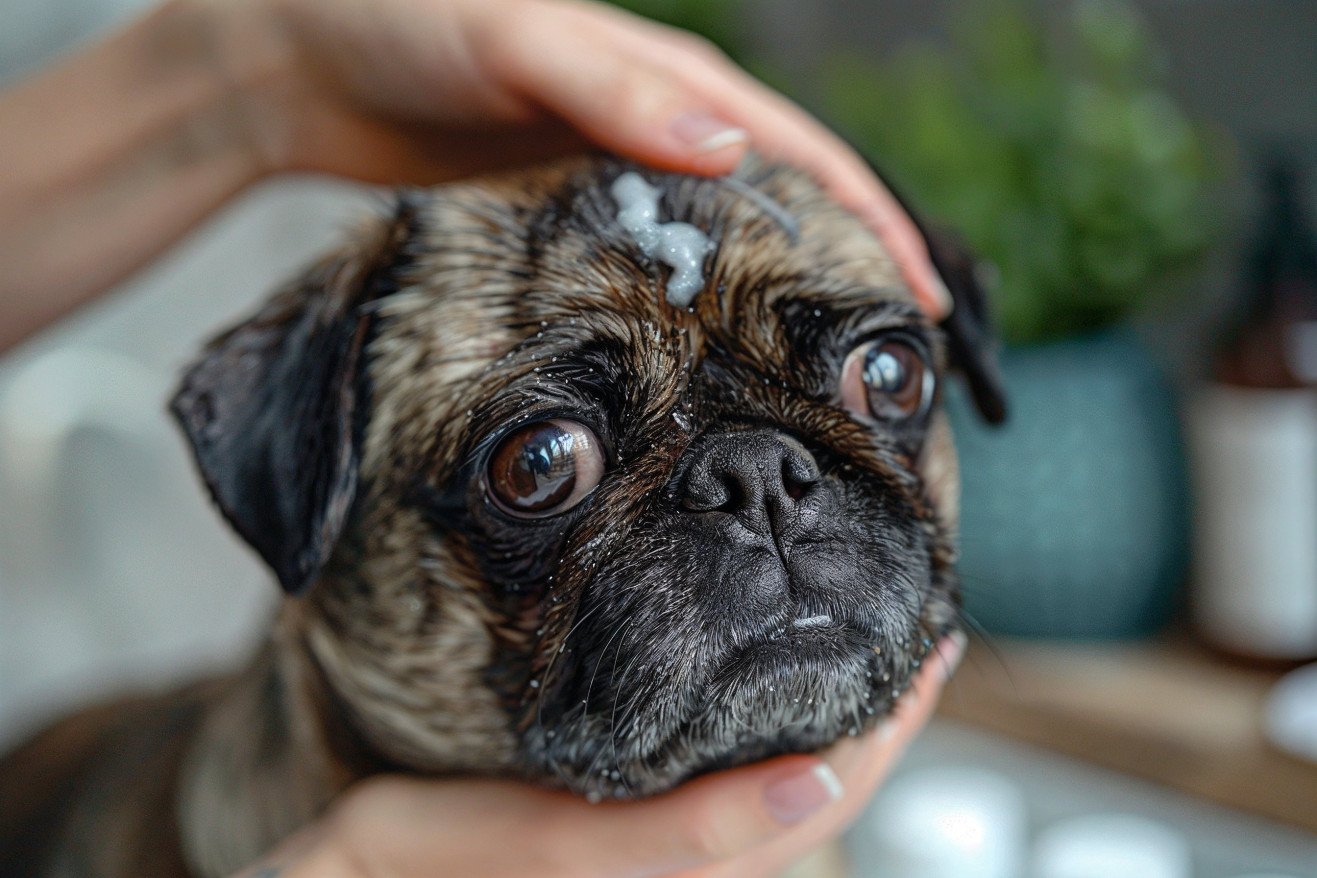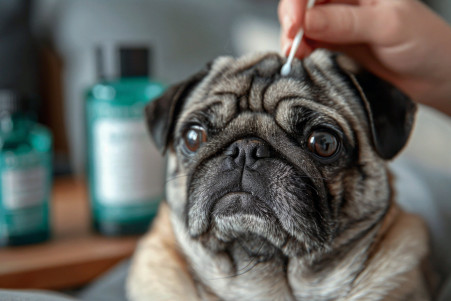Is It Safe to Put Calamine Lotion on Dogs? Here's What Vets Say, Plus Safer Alternatives
20 May 2024 • Updated 20 May 2024

If you're thinking about using calamine lotion to help relieve your dog's itchy, irritated skin, you may be hesitant to do so. While calamine lotion can help with certain skin issues in dogs, it's not the best choice because there are other pet-safe options that won't pose a risk of toxicity if your dog licks them.
In this article, we'll cover what veterinarians have to say about using calamine lotion on dogs, including the potential benefits and risks. We'll also discuss other topical treatments that are safe for dogs and may be more effective for soothing your dog's rashes, bug bites, and other skin problems. This way, you can decide whether or not calamine lotion is the right choice for your dog's skin issues.
Is it safe to put calamine lotion on dogs?
Veterinary Advice: Dangers and Safety Measures of Calamine Lotion
The main active ingredient in calamine lotion is zinc oxide, which is toxic to dogs when ingested, per Dutch.com. Zinc oxide toxicity can cause zinc poisoning, a life-threatening condition that causes damage to a dog's intestines and can be fatal if not treated.
Dogs can ingest calamine lotion by licking it off their skin or their owner's skin after it's been applied, which can increase the risk of zinc poisoning. Signs of zinc poisoning in dogs are vomiting, diarrhea (a sign of intestinal damage), weakness, pale or yellow mucus membranes, rapid breathing, and dark urine, as noted by Dutch.com.
CaniGiveMyDog.com also notes that zinc oxide toxicity can cause nausea, vomiting, diarrhea, dehydration, gum discoloration, lethargy, and liver, kidney, heart, and neurological problems, including seizures. Veterinarians advise against using calamine lotion on dogs because of these dangers and suggest looking for safe alternatives that are made specifically for pets.
If a dog ingests calamine lotion or shows symptoms of zinc poisoning, such as those listed by Dr. Rachel Barrack of Animal Acupuncture, via PetMD, it's important to get the dog to a vet right away. Waiting to seek treatment can lead to more intestinal damage and other complications of zinc poisoning. It's important to always follow the advice of a vet when it comes to using topical treatments on dogs.
Medicated Topical Solutions for Dog Skin Problems
Veterinarians suggest using pet-friendly, over-the-counter solutions that are made specifically for dogs with skin problems, notes VCA Animal Hospitals. Medicated shampoos and conditioners that help with itching, promote skin health, and prevent skin problems can help. For more serious or ongoing skin issues, prescription topical solutions, including steroids or antibiotics, may be needed.
Veterinarian-approved skin care solutions may include ingredients like oatmeal, omega-3 fatty acids, and oils that are known to be hydrating and healing, per PetMD. Make sure to always use these solutions on your dog as directed by your vet and the product packaging.
Home Remedies for Dog Skin Irritation and Itching
There are a number of natural substances that can help soothe a dog's irritated, itchy skin. According to AKC Pet Insurance, coconut oil is an excellent natural moisturizer that also has antibacterial, antiviral, and antifungal properties. Vitamin E oil is another natural option that can help moisturize and encourage healing.
Herbal and tea soaks can also be helpful. PetHonesty notes that chamomile, calendula, and green tea are all soothing, cooling, and anti-inflammatory to help reduce irritation. Oatmeal baths can help soothe and protect the skin with their anti-inflammatory properties, according to Greensboro NC Vet.
For topical treatments, aloe vera gel and turmeric paste can help reduce inflammation to heal and soothe rashes and skin problems, reports The Honest Kitchen. In addition, adjusting a dog's diet to make sure it includes omega-3 fatty acids, vitamins, and minerals can help promote healthy skin from the inside out.
While these home remedies can be helpful, it's important to talk to a vet before using any of these treatments, especially if you're going to add them to your dog's diet. It's important to make sure that you're using these treatments safely and effectively, and a vet can help you do that.
When to See a Vet for Dog Skin Problems
If a dog's skin problems don't improve or get worse and the dog is showing signs of skin irritation, such as redness, sores, or itching, it's time to see a veterinarian. Zoetis Petcare notes that more severe skin problems that need to be seen by a vet include hair loss, odor, and discoloration.
If home remedies and over-the-counter treatments don't work, it's time to see a vet for a proper diagnosis and treatment. Winter Garden Animal Hospital says that chronic or severe skin problems, such as allergies or immune-mediated diseases, will need to be seen by a veterinary dermatologist.
If skin problems are left untreated, they can lead to more serious issues and infections, so it's important to get your dog to the vet as soon as possible, according to Pet-ER.com. It's important to find and treat the cause of the skin problem to make sure your dog's skin stays healthy and they stay comfortable.
How to Recognize and Treat the Most Common Skin Problems in Dogs
Parasites such as fleas and mites are the most common cause of skin irritation and itching in dogs, notes PetMD, which can be treated with preventative medications and other medications to help the skin heal. Dogs can also suffer from allergies, including environmental and food allergies, which may require a special diet or allergy testing to get to the root of the problem, according to Loch Haven Veterinary Hospital.
Bacterial or fungal infections can cause skin rashes, lesions, or hot spots in dogs, which can be treated with antibiotics or antifungal medications to clear up the infection. Fairhaven Veterinary Hospital explains that dogs can also suffer from skin problems due to underlying health issues, including hormonal imbalances or autoimmune diseases. A veterinarian can help determine the best course of treatment for a dog's skin problem and help prevent any further issues.
Conclusion: Always Prioritize Pet Safety and Skin Health
While calamine lotion can help with mild skin irritations, it's not recommended for use on dogs due to the risk of toxicity if ingested. Veterinarians recommend using pet-safe, over-the-counter or prescription topical treatments that are specifically formulated for dogs with skin issues. Natural home remedies such as oatmeal baths, herbal soaks, and dietary supplements can also be helpful alternatives, but should be used under the guidance of a veterinarian.
Skin problems in dogs that are severe or persistent should be evaluated by a vet to ensure the underlying condition is properly diagnosed and treated. Always prioritize pet safety and skin health by using appropriate treatments and seeking professional care to ensure your dog's skin issues are addressed and managed effectively.


